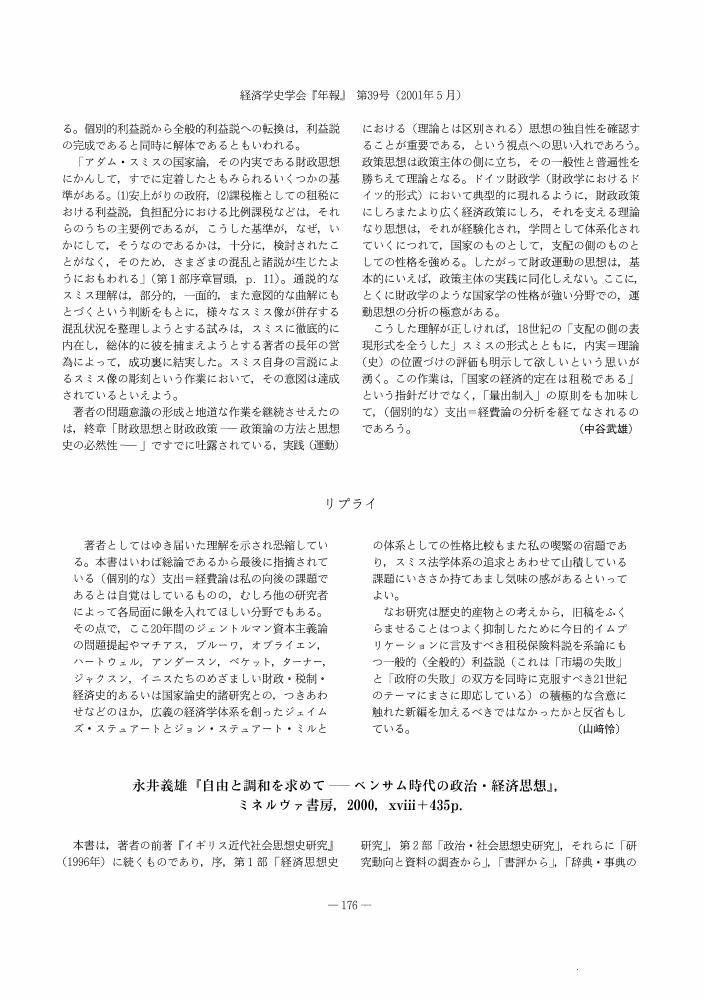2 0 0 0 モラル・エコノミーとポリティカル・エコノミー
- 著者
- 音無 通宏
- 出版者
- 経済学史学会
- 雑誌
- 経済学史学会年報 (ISSN:04534786)
- 巻号頁・発行日
- vol.36, no.36, pp.26-39, 1998
Economics today is confronted with great difficulties as it attempts to theoretically treat environmental concerns and many other serious problems. This situation, in my view, has been brought about partly by the way of thinking that confines economics largely to the analysis of the price mechanisms of goods in so far as they find their way into the market. On the contrary, the conception of “moral economy” as formulated by E. P. Thompson recognises that many important facets of the life of people in a society exist outside the market. Through research into historical sources of the food riots in eighteenth century England, he found that there existed a traditional and customary right to subsistence among the labouring poor. These poor repeatedly rioted against increases in corn and bread prices in times of dearth, selling them at prices they set themselves. In light of this history, Thompson severely criticised Adam Smith's theory of free trade in the corn market as victimizing the labouring poor, and hence he criticised Smith's political economy as a whole. However, despite his correctness in emphasising the necessity for remedies to scarcity among the poor, he seems to have misunderstood the character and nature of political economy in general. Political economy from Smith to J. S. Mill and economics even after the 1870s sought to remedy the poverty of the labouring poor as a subject and to reconcile their rights to subsistence with the right of property.
- 著者
- 音無 通宏
- 出版者
- 経済学史学会
- 雑誌
- 経済学史研究 (ISSN:18803164)
- 巻号頁・発行日
- vol.58, no.1, pp.173-174, 2016 (Released:2019-11-29)
- 著者
- 音無 通宏
- 出版者
- 経済学史学会
- 雑誌
- 経済学史研究 (ISSN:18803164)
- 巻号頁・発行日
- vol.48, no.1, pp.157-159, 2006-06-30 (Released:2010-08-05)
- 著者
- 音無 通宏
- 出版者
- 経済学史学会
- 雑誌
- 経済学史学会年報 (ISSN:04534786)
- 巻号頁・発行日
- vol.39, no.39, pp.176-178, 2001 (Released:2010-08-05)
1 0 0 0 OA モラル・エコノミーとポリティカル・エコノミー
- 著者
- 音無 通宏
- 出版者
- The Japanese Society for the History of Economic Thought
- 雑誌
- 経済学史学会年報 (ISSN:04534786)
- 巻号頁・発行日
- vol.36, no.36, pp.26-39, 1998 (Released:2010-08-05)
Economics today is confronted with great difficulties as it attempts to theoretically treat environmental concerns and many other serious problems. This situation, in my view, has been brought about partly by the way of thinking that confines economics largely to the analysis of the price mechanisms of goods in so far as they find their way into the market. On the contrary, the conception of “moral economy” as formulated by E. P. Thompson recognises that many important facets of the life of people in a society exist outside the market. Through research into historical sources of the food riots in eighteenth century England, he found that there existed a traditional and customary right to subsistence among the labouring poor. These poor repeatedly rioted against increases in corn and bread prices in times of dearth, selling them at prices they set themselves. In light of this history, Thompson severely criticised Adam Smith's theory of free trade in the corn market as victimizing the labouring poor, and hence he criticised Smith's political economy as a whole. However, despite his correctness in emphasising the necessity for remedies to scarcity among the poor, he seems to have misunderstood the character and nature of political economy in general. Political economy from Smith to J. S. Mill and economics even after the 1870s sought to remedy the poverty of the labouring poor as a subject and to reconcile their rights to subsistence with the right of property.
- 著者
- 音無 通宏
- 出版者
- 経済学史学会
- 雑誌
- 経済学史学会年報 (ISSN:04534786)
- 巻号頁・発行日
- vol.33, no.33, pp.185, 1995 (Released:2010-08-05)
1 0 0 0 OA John R. Dinwiddy, Radicalism and Reform in Britain, 1780-1850, Hambledon Press, 1992, xx+452p.
- 著者
- 音無 通宏
- 出版者
- The Japanese Society for the History of Economic Thought
- 雑誌
- 経済学史学会年報 (ISSN:04534786)
- 巻号頁・発行日
- vol.32, no.32, pp.143, 1994 (Released:2010-08-05)
1 0 0 0 OA いわゆるバウリング版『ベンサム全集』の成立経過と編集者問題
- 著者
- 音無 通宏
- 出版者
- The Japanese Society for the History of Economic Thought
- 雑誌
- 経済学史学会年報 (ISSN:04534786)
- 巻号頁・発行日
- vol.31, no.31, pp.14-26, 1993 (Released:2010-08-05)
The first English collected edition of Bentham's works was edited and published under the ‘superintendence’ of John Bowirng. This is a commonpalce today, but little is known about the processes. Bowring was bequeathed by Bentham the greater part of manuscripts to be published after his death. However, Bowring not only excluded his religious writings from the collected edition, but also left many manuscripts unpublished. The Works was originally planned in seven volumes. But it was eventually published in eleven volumes in Part, and yet the publication of volumes was not in order. Bowring himself was absorbed in his own business during the period of compiling The Works. The editorial tasks were substantially carried out by his friends, R. Smith, T. S. Smith, R. Doane and J. H. Burton. As can be seen from the list of editors attached to the present paper, the greatest and final responsibility for editing The Works was in Burton's hands. Therefore, the first English collected edition of Bentham's works should be called Burton's edition rather than Bowring's.
- 著者
- 音無 通宏
- 出版者
- The Japanese Society for the History of Economic Thought
- 雑誌
- 経済学史学会年報 (ISSN:04534786)
- 巻号頁・発行日
- vol.24, no.24, pp.60, 1986 (Released:2010-08-05)





